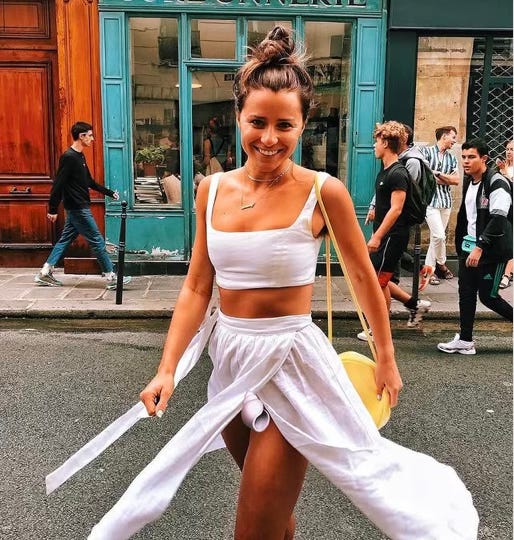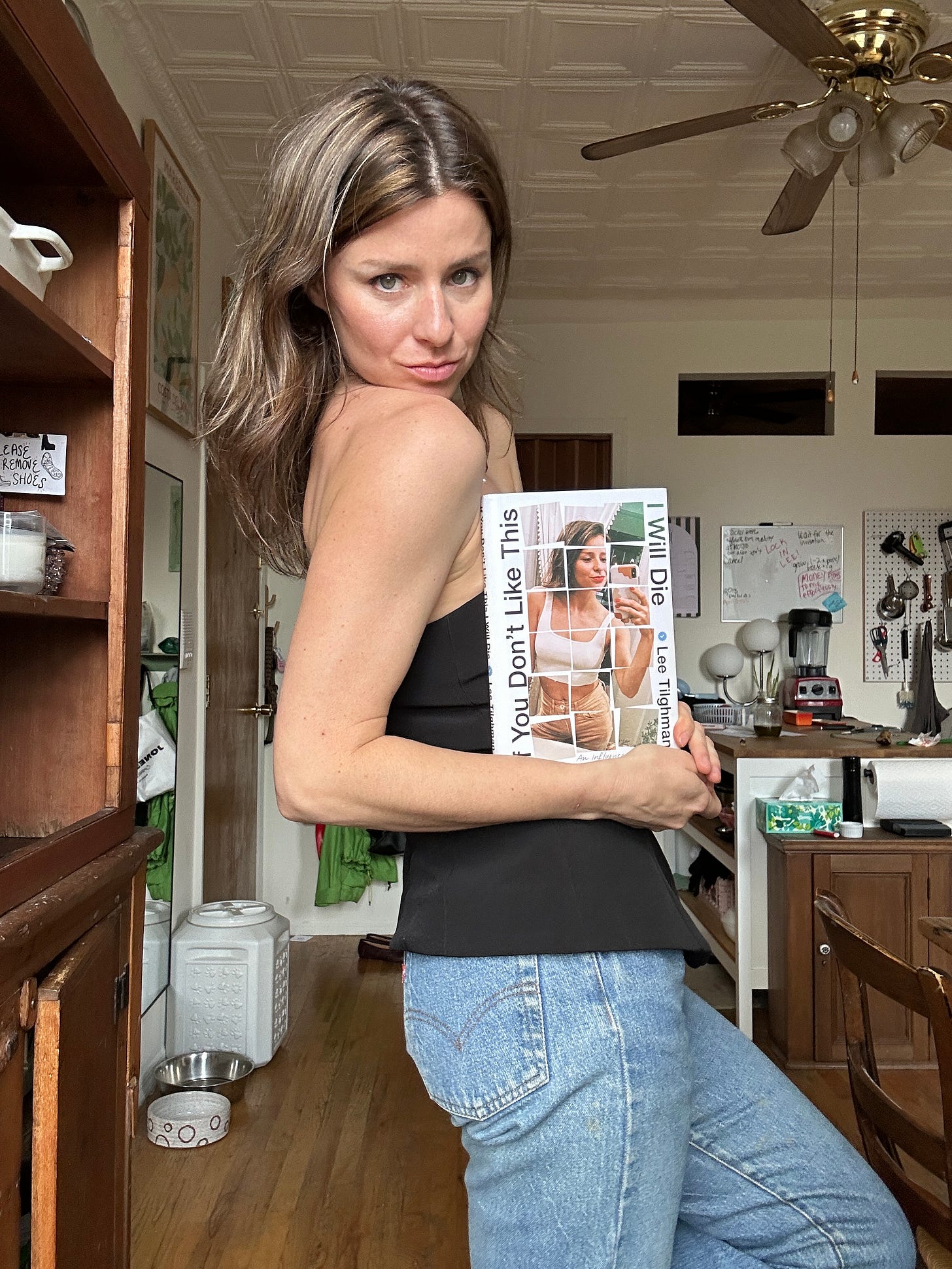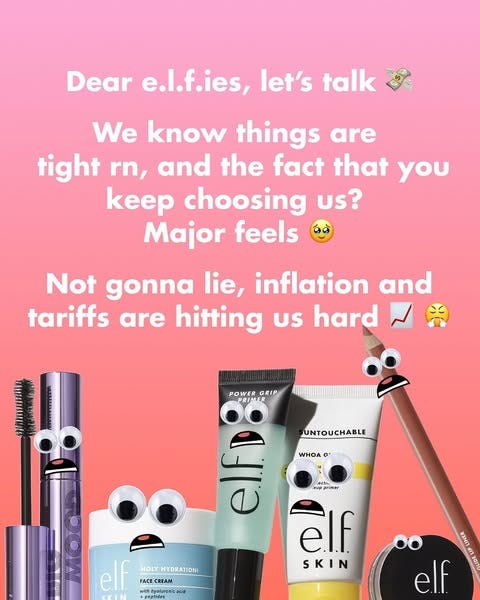I was canceled for raising my prices
And what e.l.f., Saie Beauty, and comment-section consultants taught me about women, business, and being liked.
T-2 months until my memoir comes out! IF YOU DON’T LIKE THIS, I WILL DIE is an influencer memoir that unpacks the unseen cost of sharing everything online and turning yourself into a personal lifestyle brand (apparently, everyone’s dream job!). It’s out on August 12, 2025, with Simon & Schuster.
This book is going to resonate with millions. It’s about seeking validation online, losing yourself in the performance, and what it takes to reclaim your identity when the applause stops. It’s about ambition, burnout, cancel culture, female likability, and the high price of being constantly visible. Publishers Weekly calls it “a memoir full of trenchant insights and bracing candor about the psychological toll of influencer culture.”
For the next two months, my weekly essays will still explore cultural moments and personal revelations while also weaving in core themes from the book. Most will be free to read, and at the end of each one, I’ll share a deleted scene or behind-the-scenes insight from the book, just for my paid subscribers and most loyal readers. Thanks for being here, “besties” (you’ll get the joke when you read my essay below.)
I was canceled for raising my prices
A week or two ago, I saw a post come up on my IG feed.
In it, e.l.f. Cosmetics delivers a price hike announcement through a candy-colored graphic where their products have googly eyes and speak in TikTok-coded, emotionally needy language.
The tone is emotional bestie-in-a-crisis—like your close friend calling you with a shaky voice to break some hard news, maybe that she can’t be your maid of honor after all, but she still loves you so much and hopes you’ll still love her.
It’s a blend of faux vulnerability, exaggerated relatability, and hyper-casual language that mimics the intimacy of a personal relationship, despite it coming from a for-profit brand (no wonder Gen-Z feels lonely… they are turning to products for love). The googly eyes and emojis only deepen the effect, turning what’s essentially a corporate price hike into a shared emotional moment.
Needless to say, I was disturbed by the tone and language. I’m not e.l.f.’s target customer—I’m older, and I don’t look to brands to tell me how to feel. But I asked myself: Why did this bother me so much?
It’s because their post took me right back to 2018 to when I was canceled for raising my prices. I remember the pressure to speak to my followers/admirers/customers in the sweetest, softest, most apologetic voice I could muster. At that point, it wasn’t even pressure; it was survival. I was so desperate for everyone to like me. My brand depended on it. (Now you must understand the title of my book?)

I get why this soft, sweet, feminine tactic works for brands like e.l.f. They’re built on being accessible and appealing to everyone. They’re speaking to their Gen-Z customer base, which treats spending as relational and emotional, a way to signal their values, politics, and identity.
But I have to ask… what’s the cost of all this emotional branding?
In October 2018, I launched a 3-city workshop tour and was met with an onslaught of negative, even threatening, comments. I had raised my prices substantially and expected some pushback, but nothing could have prepared me for the level of hate that followed. I go deep into the entire escapade in the book: the days leading up to the announcement, the initial wave of “you go girl!” support, and the swift, brutal turn that came next.
I remember being terrified for my safety and my business. I had never felt lower in my life. But I’m so grateful for that experience. Facing that kind of hate shaped me into the woman I am today. It made me angry, too—and view critics/critiques with a kind of levity I’ve never had before. It also gave me the framework and the perspective to create this piece of work that I’m now offering to the world: my book, out this summer. If you’ve ever been canceled, called out, put down, or made to feel small for taking up space (even just for asking for a raise at work), this book is for you.
But this experience did not just shape me personally and spiritually. It also changed how I see branding, business, and the way female-forward brands are expected to move through the world. Especially when they ask for more.
This issue mysteriously only seems to affect female-centric/owned brands. Is
, maker of the Theragun, apologizing with childlike emojis to their followers when their prices go up? (No, they aren’t.)I was having coffee this week with friend/author/founder
. She told me that when @saiebeauty (more millennial-facing) made a similar announcement (this time, calm, businesslike, and far less emotional), they were met with backlash.Saie’s message (tariff price hikes) is the same as e.l.f.’s, but the tone is steady, grounded, and trusting. It’s trying to communicate without drama. There is no performance. It’s just a clear explanation.
The criticism was swift.
”Stop sending influencers boxes of free stuff and expecting us to foot the bill,” one commenter said. “Saie hit $100m in sales this year and is passing the price of ‘tariffs’ onto consumers, who barely make ends meet,” wrote another. “I won’t be purchasing again,” reads hundreds of comments.
The difference in reaction between the two brands’ announcements is jarring. The sweet, friendly note from e.l.f. got praised for its transparency and kindness. Meanwhile, Saie’s more adult language got pummeled for being “profit-driven”. (Um, hello, it’s a makeup brand??)
Suddenly, their comment section was full of self-appointed business consultants and margin specialists: “Why not only raise prices on the products actually affected, like Glow Recipe did?”
The Instagram MBAs came for me back in 2018, too, suggesting I “host my workshop in a YMCA to keep costs down” or “sell 100 tickets for $100 each and pocket $10,000”. LOL.
It left me wondering then, and still now: what do women owe other women? And what do female-led businesses owe their audiences?
Public humiliation, likability politics, and female ambition are all themes I dig into in If You Don’t Like This, I Will Die. And this moment—then and now—raises an even bigger question:
Why are we so emotionally attached to brands in the first place?
Glossier was the first brand I remember that spoke to its customers like a friend. Then came Outdoor Voices. They were all like, “Hello, hey, hi!” It was refreshing. In the early days of social media, we believed brands were our friends.
I’m not against good customer service or clear communication. But there’s a difference between being communicative and being performatively sweet. Sometimes I think it’s a power move for a brand to simply say, “Our prices are going up. Sorry it has to be that way.” We’re all adults here. We can all handle something as non-emotional and logistical as business margins like grown-ups. I’m okay with that.
I don’t like the begging, the placating, the need to be soft and sweet to be heard. And I don’t like being spoken to like a child. e.l.f. has positioned itself to ask for permission, just like women so often feel they have to—while male-led brands don’t. They just say what they need. No emotion. No googly eyes.
I don’t know. What do you guys think?
Below is a special unedited excerpt for paid subscribers from my memoir’s original draft. It’s from the week I was canceled: the fear, the scramble, the call with a Hollywood crisis PR expert, and the eventual video apology I recorded (the kind celebs post when they get caught in a scandal). For paid subscribers only!








